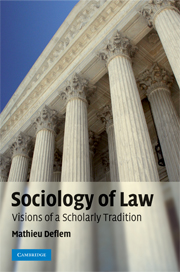Book contents
- Frontmatter
- Contents
- Preface and acknowledgements
- Introduction: sociology, society, law
- Part I Theoretical foundations of the sociology of law
- Part II Development and variations of the sociology of law
- Part III Sociological dimensions of law
- 7 Law and economy: the regulation of the market
- 8 Law and politics: the role of democratic law
- 9 Law and integration: the legal profession
- 10 Law and culture: the balance of values through norms
- Part IV Special problems of law
- Conclusion: Visions of the sociology of law
- Bibliography
- Index
9 - Law and integration: the legal profession
Published online by Cambridge University Press: 05 June 2012
- Frontmatter
- Contents
- Preface and acknowledgements
- Introduction: sociology, society, law
- Part I Theoretical foundations of the sociology of law
- Part II Development and variations of the sociology of law
- Part III Sociological dimensions of law
- 7 Law and economy: the regulation of the market
- 8 Law and politics: the role of democratic law
- 9 Law and integration: the legal profession
- 10 Law and culture: the balance of values through norms
- Part IV Special problems of law
- Conclusion: Visions of the sociology of law
- Bibliography
- Index
Summary
In terms of law's function to secure social integration or regulate behavior, a central role is played by the legal profession as the experts of law. The legal profession is arguably the single most researched aspect of law in legal scholarship and socio-legal studies. Among the many topics studied are the history and transformation of the legal profession, the regulation of the profession, the structures and practices of legal education and admission to the bar, the relationship between attorney and client, and the organization of legal work. Indicating that this abundance of work is itself a function of the professionalization of legal work, most scholarly research on the legal profession comes from within legal scholarship and from perspectives of the law and society tradition that are part of or closely associated with legal education. The professionalization of scholarship dealing with the legal profession is also reflected in the most common questions that this research addresses, typically focusing on technical aspects that relate to the competitive business of the profession rather than the sociologically relevant dimensions of its societal dynamics.
The successful monopolization of the study of the legal profession by legal scholarship and its relative insularity from independent scholarly reflection testify to the profession's centrality as a matter of legal autonomy, which conceptually goes back to de Montesquieu's separation of powers principle.
- Type
- Chapter
- Information
- Sociology of LawVisions of a Scholarly Tradition, pp. 181 - 197Publisher: Cambridge University PressPrint publication year: 2008
- 1
- Cited by



